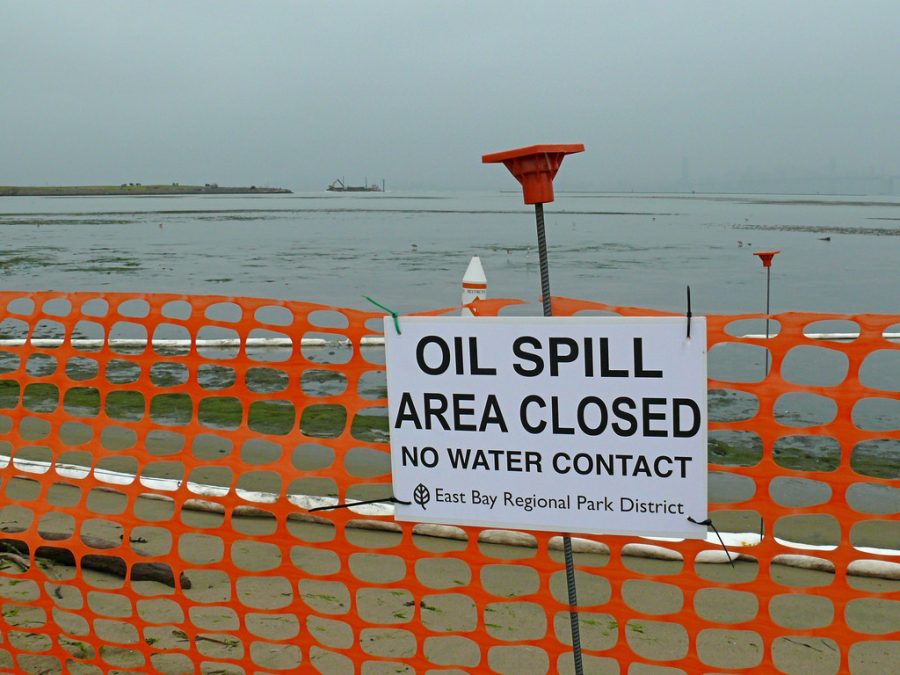California Fits the Bill to End Oil Drilling
Courtesy of Ingrid Taylor An oil spill took place at San Francisco as recent as 2007 which prompted recent protests against oil drilling.
While the Trump administration is promoting their new drilling program with U.S Interior Secretary Ryan Zinke citing “energy dominance in America” as justification, California is currently objecting the push. Cities on the coast of California have been taking action to keep offshore drilling from happening, ranging from passing ballot measures to protesting along the coastal cities. With Florida successfully making itself off-limits for offshore drilling on January 9, California hopes to follow suit and escape the threat of potential oil spills happening as well. California is currently trying to draft a new bill that could potentially stop all oil companies such as Nabors and Diamond offshore from making plans for offshore drilling. The bill that has been presented includes an agenda of building new piers and banning oil pipelines in state controlled waters. Additionally, California Lieutenant Governor Gavin Newsom has threatened to block pipeline permits to transfer oil into the state. In a quote from Reuters, he declared, “I am resolved that not a single drop of Trump’s new oil ever makes landfall in California.’’ However, oil companies may have found a way around these new countermeasures. According to National Public Radio, oil companies do not need shore pipelines as they can use floating pipelines called FPSOs as an alternative. Even so, as these are expensive and harder to use, California is hoping that their plan will still deter oil producers. In the past, Oil companies have given up trying to get rights to drill in California before, so it is possible that history might repeat itself.
The person in charge of the plan to stop offshore drilling is Lieutenant Governor Newsom. In a statement to CNBC, he said, “The state will use every tool available to resist President Donald Trump’s cynical regressive agenda.” California hopes to spread their plan to all surrounding coastal states that also disapprove of offshore drilling with the Coastal Zone Management Act. This legislation gives states the authority to review offshore federal and industrial activity that would impact their local environment while allowing them to make sure that it is up to date with state environmental policies. This law applies to all the coastal states along the Pacific, Atlantic, Gulf of Mexico, and the state of Alaska.
Fishermen, environmentalists, critics, and people from the local community in Sacramento protested outside of the state capitol building on February 8. According to Reuters, many gathered with signs saying, “Oil and Sea Life Don’t Mix” and “Stop Killing Your Mother.” During the protest, California State Senator Hannah Beth Jackson made an appearance and said “Don’t pollute the planet for your own profit.’’ The crowd responded with roaring applause and cheers.
The protestors were primarily concerned with the issue that no safety standards have been issued since 2010, which is the year that the worst oil spill in American history took place. The spill was on the Gulf of Mexico, where the Deepwater Horizon oil rig exploded and sunk down into the ocean. According to Ocean Portal, 3.19 million barrels of oil went into the gulf and sunk 5,000 feet underwater, killing a great number of marine life. Many years before, an oil spill on the California coast resulted in the ban of offshore drilling in California. Additionally, in 1969, three million gallons of crude oil swept into the ocean by Santa Barbara and spread out for 35 miles, killing thousands of birds, marine mammals and fish. This alarming record of oil spills have given these protestors a reason to be concerned.
Another problem with offshore drilling is its effect on animals in the event of another oil spill. According to an article published by The Center of Biological Diversity, around 82,000 birds and 102 different species were affected by The Gulf Oil Spill. 6,000 turtles, all listed as endangered, were harmed in the oil spill; in total, over 25,000 marine mammals were negatively impacted. Although there are compelling reasons on both sides of the issue, the outcome of the battle between California and the oil companies remains uncertain to all.






